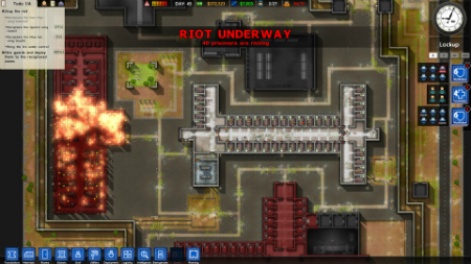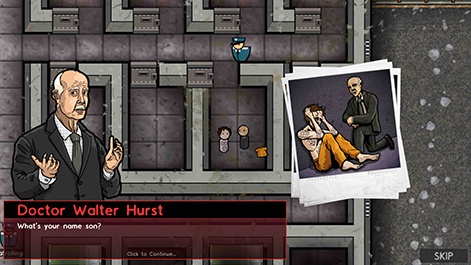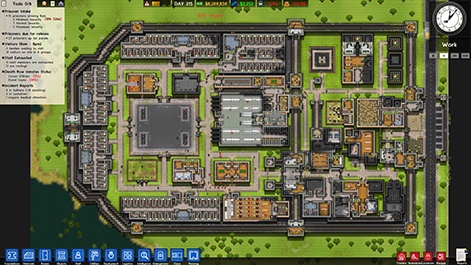The history of UK developer Introversion makes for some very painful reading. For every massive success the team has had, it has also weathered some very dark times.
To pick one example, the developer saw modest success with its second game, Darwinia, which launched in 2005 to critical acclaim. Introversion signed a deal with Microsoft to bring the project to Xbox 360, but this turned out to be massively painful experience in terms of coding, but also due to the platform holder's demand for a multiplayer aspect.
What would become Darwinia+ launched and sold barely any units. What happened next was Introversion laying off all of its staff, apart from two of its founders, Mark Morris and Chris Delay.
But fortunately, the studio was able to limp on thanks to a then-new games storefront called Humble coming to the rescue.
"We didn't have a lot of cash," Morris says.
"We had virtually bankrupted ourselves off the back of Darwinia+. Humble had rescued us with an Introversion bundle so we had enough to keep a small core team going for about a year. It was just me and Chris. $100,000 gets a couple of you two years at a stretch if you love making games."
The team set about working on a new project. This time, Introversion wanted to simulate what it was like to manage a prison.
"[The pitch] was to build and manage a maximum security prison," Morris says.
"One of the things that I think gave us a lot of confidence that Prison Architect was good was that you can say it in a sentence. If you could think about it happening in a prison, it's going to happen in your prison and you're going to be able to do something about it. That was always the initial concept. And that's what we delivered what we delivered."

To release this project, Morris and co decided to do something that - in the early 2010s - defied most logic. It was going to launch the game unfinished.
This model wasn't unprecedented, with Minecraft being the highest profile example of a developer releasing an alpha build of a game. In fact, the team also considered turning to Kickstarter to fund the release.
"We knew we didn't have enough time to make the game complete in that period, so we had to do something," Morris explains.
"Humble was new – it was a revelation for us. Gamers would pay than a cent for a game if you asked them to. Also, Kickstarter was gaining real traction and interest. This idea that you could sell an idea or concept. We were really scratching our heads about what would be the right way to go forward with it. Ultimately we didn't want to use Kickstarter; there were some operational reasons why we couldn't. In those days you had to have a US bank account and we didn't want to jump through those hoops. There were two questions that Kickstarter still asks that I can't answer for any games project: how much money do you want and how long do you want to run your Kickstarter for? I don't want to have to answer those. I don't want to have to pin down those."

The decision to release an unfinished game was not one the team took lightly, especially when much of the press around Introversion had not been stellar.
"We used the Kickstarter model, took the different tiers, set that up on our own site and only told a few journalists," Morris says.
"All of the news that had come out of Introversion had been negative; it was us failing, things going wrong, going bankrupt. I really couldn't face having to tell people that we had made another enormous cock-up that hadn't worked. I really wanted Prison Architect's launch to be quiet. We didn't want that many players because we were worried people would be buying into something that we knew was buggy and they were going to misunderstand that it's buggy and demand money back. That would have been a PR disaster. We wanted this to be quite a slow burner."

But the launch went much better than Morris and Introversion anticipated, with the game raking in a fair bit of cash for the studio.
"When we actually launched it, the four journalists wrote up what they saw but it just went nuts," he says.
"We did $100,000 in the first three days. It was crazy. We had done $1m by the end of the first month just off the back of these postings. It had taken us a year to get to Alpha One. I always believed that was a big part of its success. Even though we were saying it was early access, it's going to be full of bugs so don't expect much, actually when you fired it up you were able to play it for four or five hours and really get lost in it."
By the time the game finally launched, it was closing in on $19m in sales with over 1.25m units sold; at the end of last yeah, Introversion announced that the game had sold two million copies.
Looking back on the development of Prison Architect, Morris remembers it being a positive experience - not just due to its commercial performance.
"Prison Architect was a wonderful project, not just in terms of its success but the development cycle was really nice," he says.
"We were putting out an update every month, we knew what those updates were going to be like, we knew how to make a video at the end of the month to sell it. Everyone was in this really nice rhythm which was running and ticking over."
The good news sadly has not continued, with the studio's subsequent project Scanner Sombre selling - by Introversion's own admission - rather poorly. But Prison Architect gave the company the ability to weather another hit, and he says the studio is ready to bounce back.
"The industry is always changing and moving on. Early Access and what we did with Prison Architect had so many benefits. We didn't move away from that because we thought that we could do better. We moved away because we wanted a bit of a break from the grind," he says.
"We're in a position where we have had that break and are once again hungry for success and ready to get back into the grind. We're currently looking at new ideas that would suit that development model and we'll turn them into real things and put them in front of people and see how the world reacts. That's also part of why I love our industry so much; if it doesn't work, then things will change again for us.
"Prison Architect has given us a very firm footing to be able to do this for a good while. If it's successful then brilliant, we'll crack. If not, we'll have to look at a phase of Introversion. We've been through several phases in the past and maybe there's a new way of doing this."













